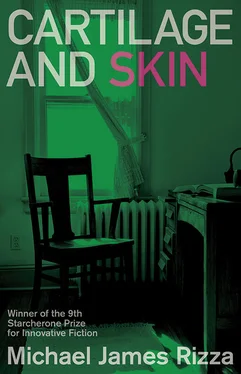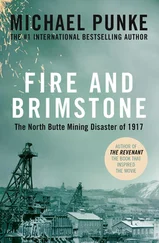I lightly poked his ribs with the toe of my slippered foot. The boy made a soft noise, and his body attempted to straighten but then curled itself up again, more tightly than before. A sour stench filled the room. The faucet ran at a trickle. I had an impulse to leave him, as if I could efface him from the world by simply closing the bathroom door. But I kneeled down on the tile and lifted his head. I remember that I kept speaking, saying things like “Come on now. Get up,” hoping to bring his limp body to life. He was a wet, disgusting thing. Apparently, sometime during the night, as I’d sweated and tossed in bed, everything inside of the boy had tried to evacuate itself through every orifice it could find.
After the ambulance ride and the long hours in an orange plastic chair in the hospital waiting room; after the policeman with broad shoulders and a thin, lipless mouth; after the plump woman from Dyfus with her slow, soothing voice and her dark eyes that never left my face during the entirety of our discourse — which she called our appointments — all the while my refrain sounding again and again: I don’t know the boy or what has happened to him; after a thorough inquiry was made and even the boy himself was by then well enough to be questioned, and my life was raked down to the roots, so all that could be seen was seen, and I felt as though I had been pumped dry by a chafed hand; after all that and so much more which I’m happy to pass over and never preserve with words — what finally exculpated me, what finally saved me despite my landlord’s slanders, was that out of the three different traces of semen collected from the boy’s body, none was mine.
PART TWO: MOTHERS AND WHORES
Even though I was eventually able to wash my hands of the boy and leave him to his lunacy, to howl and slobber and writhe within the walls of some white ward, where all the staff, mostly women, was trained to smile mechanically and speak in warm soothing tones — my brief encounter with my errand-runner continued to influence my life. I felt that I was constantly under surveillance and that I would continue to be a suspect despite my apparent freedom. From the cashier at the checkout line in the grocery store to the chubby, pimply boy where I rented movies, everyone seemed to watch me. I no longer bought the food I usually bought or rented the kind of movies I liked to watch. Everywhere was a monitor, which made me a bit irascible and curt. I couldn’t even find the humor in the little prank I played on Morris the sister. After we’d arranged our meeting by letter, she went and sat alone in the coffee shop and waited for me; in the little drama she undoubtedly cooked in her little brain, I was to play Parker the penitent, while she was Mother Morris the sister. Yet the day came and went. I sensed that something was special about the day, but I couldn’t remember what I was missing, what holiday, feast, or national day of observance. Perhaps it was the anniversary of my father’s death. The exact date had slipped my mind years back, and I’d refused to ask my mother because I feared fixing it in memory or being tempted to mark it down, once and for all, on the calendar or the wall. I preferred ignorance over commemoration. Just knowing the month was enough. He had once written me a brief letter, in which he apologized for making fun of me. I kept it hidden behind the cardboard backing of a picture frame; a print of the poem “Footprints,” in neat curvy calligraphy, faced the glass. I had no reason to lift it from the wall and dismantle the frame because I knew what the letter contained: I feel bad about saying your hair is a filthy rat’s nest . Of course, this was an easy apology to accept, given that my first knowledge of this particular insult had come through the letter itself. Still, I didn’t like thinking about any of this, for a vague, pestilent cloud of dread hovered within my mind — when, instead, I should have been laughing at the sister, who wished to reconcile me with my lackadaisical benefactor, but who simply sat with the collection plate in her lap, waiting for my tithe and my penance. The joke was wasted, the day just another unpleasant day.
What’s more or, rather, what’s worse was that my fear of surveillance compelled me to destroy my character study of W. McTeal. At first, immediately after I had returned home from the hospital to await the diagnosis of the boy, I had simply hid the pictures and the profile. I’d pulled off the back panel of the nightstand beside my bed and slipped the packet in a slight crevice between the drawers. Convinced that the hiding place would never be discovered, I prided myself on being clever, but I couldn’t help feeling vulnerable. The cloud of dread lingered, as though forgetting the exact day of my father’s death somehow allowed me to wallow in it for a full month. Eventually, the boy was placed under the state’s care, to be pimped out with pills and probed with inquiries by interns taking turns on him, and I was thanked for my efforts and patience during the investigation. Apparently, the boy agitated the plump woman from Dyfus. Beyond what I ever could have expected, his mind was diseased, his attitude vile, and his story filled with gaps and puffed up with nonsense. The woman’s equanimity and control amazed me at first; her demeanor appeared so studied and exact that I suspected that such training was a standard part of the curriculum of a social worker. One afternoon, however, I noticed something strange while she sat at the table with her usual mug of coffee. Despite her apparent calmness, she continued to put the mug to her lips and take sips, even though it was empty. She looked about thirty years old; she had no ring on her finger, and her body, as shapely as a tree trunk, seemed to contain no sap of sexuality. She had spent so much time studying psychology and urban malaise that she’d forgotten about her own needs, such as companionship, desire, and love. She had smooth skin and a scent like baby powder. In truth, however, all I really knew about her was that she possessed a fierce intelligence. Whether she went home every night to spoon-feed and sponge-clean some aged father, or leapt headfirst into an orgiastic feast of bloated and disgruntled lesbian flesh, or simply watched television with a bowl of ice cream in her lap, I do not know. In fact, I had no time even to wonder or care. I was at stake, the boy was at stake, and she was the faceless and anonymous mouthpiece of our fate. Watching her drink sips of phantom coffee from the mug, I gathered that the boy made her job difficult. She didn’t seem to know how to reconstruct his story from what he said — a task that I have taken upon myself; it is the saddest story I have ever heard. At first, my intention was to wait for enough time to pass — giving me a safe distance from the horrid events — and then send my fuller reconstruction of the boy’s story to the social worker, to alleviate her confusion. But now I know that she is a deceptive, cruel monster who deserves no kindness from me. At the appropriate moment, I will relay her treachery and the boy’s defilement.
After the initial police investigation, I was left alone. Yet the tentacles of their inquiry had wormed deeply into my life — how many calls to my mother, my colleagues, and my neighbors? I didn’t know. More than ashamed, I was terrified. I doubted that the investigation could just stop cold. Behind the sudden silence and peace, some massive onslaught seemed to be gathering strength and getting ready to crash over me at any second. The waiting drove me mad, so one night I pulled off the panel backing, took out the manila envelope, and carried it to the kitchen. Save for the flickering light cast by the gas burner, the room was dark. I put the stopper in the sink and turned on the faucet. First, I made ribbons out of each picture, one by one, with a pair of scissors, and then I picked up each piece with a set of metal salad tongs and watched the sliver of photograph dissolve and burn black in the blue flame of the stove. Each time, I held the burning strip above the sink as it curled and burned down, dropping ashes into the water. When I destroyed the last piece of evidence and thus, in a sense, dismembered and incinerated the freaky, naked man, I let the water out of the sink — but the ashes didn’t swirl away as I’d expected; instead, they coated the sink with gray scum, which, because of the darkness, I didn’t notice until the next morning.
Читать дальше












